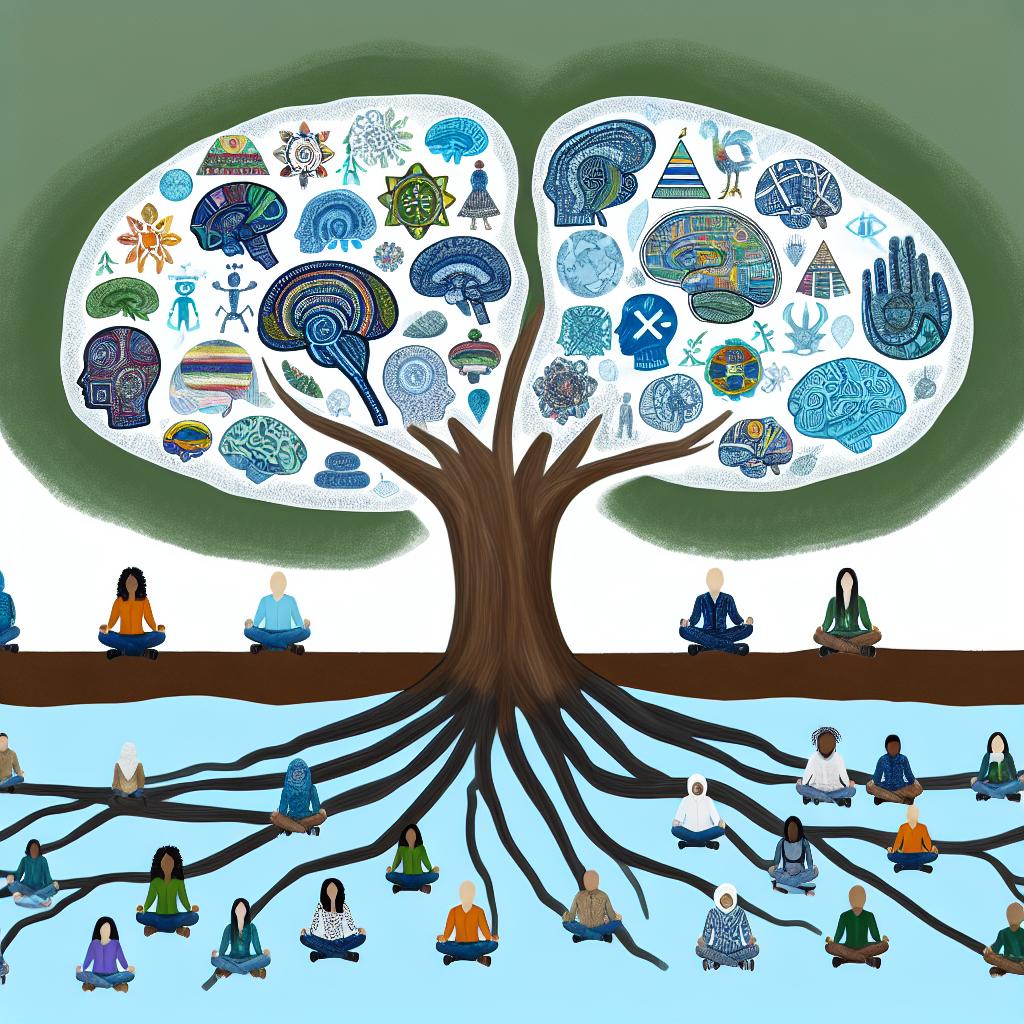Introduction to Culture and Mental Health
Culture profoundly influences various aspects of mental health, affecting how individuals and communities respond to mental illness. It encompasses beliefs, customs, values, and practices that shape an individual’s worldview and behaviors. These cultural elements play a vital role in the understanding, diagnosis, and treatment of mental health issues.
Understanding Cultural Differences
The perception and expression of mental health symptoms are often culturally bound. For example, in some cultures, mental health disorders may be understood as a spiritual affliction rather than a medical condition. This cultural framework can affect whether individuals or groups seek mental health care and how they describe their symptoms. Such cultural variances necessitate a nuanced approach for healthcare providers when addressing mental health challenges across different populations.
Traditional views on mental illness in some cultures often combine with religious or spiritual beliefs, framing psychological distress in terms of moral failings or supernatural influences. As such, a mental health issue might be perceived as a result of wrongdoing or the influence of malevolent forces. In contrast, other cultures might view mental disorders more straightforwardly as biological or physiological phenomena, akin to physical ailments. These perceptions deeply influence not only how symptoms are interpreted but also the types of support and treatment sought by individuals experiencing such challenges.
The Role of Language
Language is a fundamental component of culture, influencing how individuals express their thoughts and emotions. In cultures where mental health disorders are stigmatized, language might be restricted in describing these experiences, leading to variations in symptom reporting. This can complicate the diagnostic process for mental health professionals working with diverse populations.
Mental health providers must develop awareness of the ways language can both elucidate and obscure mental health symptoms. In multilingual societies or regions with a dominant language and dialect diversity, understanding patient communication is essential for accurate diagnosis and treatment. Furthermore, healthcare professionals need to be sensitive to nuances in how terms related to mental health issues are used and understood locally. Providing care that respects linguistic preferences and language competence is part and parcel of delivering effective mental health services.
Cultural Stigma and Mental Health
Stigma associated with mental health conditions varies significantly across cultures. In some societies, mental illness is heavily stigmatized, discouraging individuals from seeking help. The fear of being ostracized often leads to delayed treatment and worsens the prognosis of mental health conditions.
This societal pressure can manifest in various forms, from outright discrimination to subtle exclusions from community activities. The stigma can impede social and occupational opportunities for individuals, thus adding layers to personal struggles with mental health. Removing this barrier requires a concerted effort within the community to provide education on mental health issues, normalizing seeking help, and advocating for policy changes that offer protections and support for affected individuals.
Impact on Treatment Approaches
Cultural beliefs can influence the preferred methods of treatment for mental health issues. Some cultures may favor traditional healers or alternative medicine, such as herbal remedies or spiritual practices, over conventional psychiatric treatments. Mental health professionals need to be culturally competent, recognizing and respecting these preferences while guiding individuals toward effective interventions.
The intersection of traditional practices with modern medicine demands a collaborative approach where mental health practitioners and traditional healers work together. Understanding these cultural lenses can provide healthcare providers with valuable insights into designing effective treatment strategies. Practitioners should be open to incorporating beneficial traditional methods alongside evidence-based practices to support recovery and manage symptoms effectively.
Cultural Competence in Mental Health Care
Cultural competence involves understanding and appreciating a patient’s cultural background and tailoring treatment plans to meet their needs effectively. This approach helps build trust between patients and healthcare providers and enhances the effectiveness of mental health services.
Achieving cultural competence is an ongoing, dynamic process. Mental health practitioners should engage in continuous education and self-reflection on their cultural assumptions and biases. Fostering cultural competence demands proactive listening, respect for diverse worldviews, and an adaptability that prioritizes patient-centered care. Encouraging community involvement and feedback on mental health programs can further enrich the body’s understanding of specific cultural expectations and needs.
The Importance of Culturally Adapted Interventions
Culturally adapted interventions are designed to align with the cultural values, practices, and language of a specific population. Such interventions prove more effective as they resonate with the patient’s cultural context, increasing engagement and adherence to treatment plans.
Designing culturally adapted interventions entails an in-depth comprehension of the target population’s heritage, traditions, and language. This involves collaboration with local cultural experts or community members who can provide insights into crafting approaches that are not only acceptable but also welcoming. Evaluating the efficacy of these interventions over time allows for adaptable strategies that keep pace with cultural shifts and ongoing global changes.
Conclusion
Acknowledging and integrating cultural aspects into mental health care is crucial for providing comprehensive and effective support. As societies become increasingly multicultural, mental health practitioners must develop a deeper understanding of cultural influences on mental health to improve outcomes for diverse populations.
By fostering an environment where cultural considerations are integral to mental health strategies, healthcare systems can better serve their communities, ensuring not only clinical effectiveness but also care that respects individual identities and experiences. This commitment to cultural inclusivity thus enhances overall wellbeing, bridging gaps between diverse populations and the mental health services available to them.



